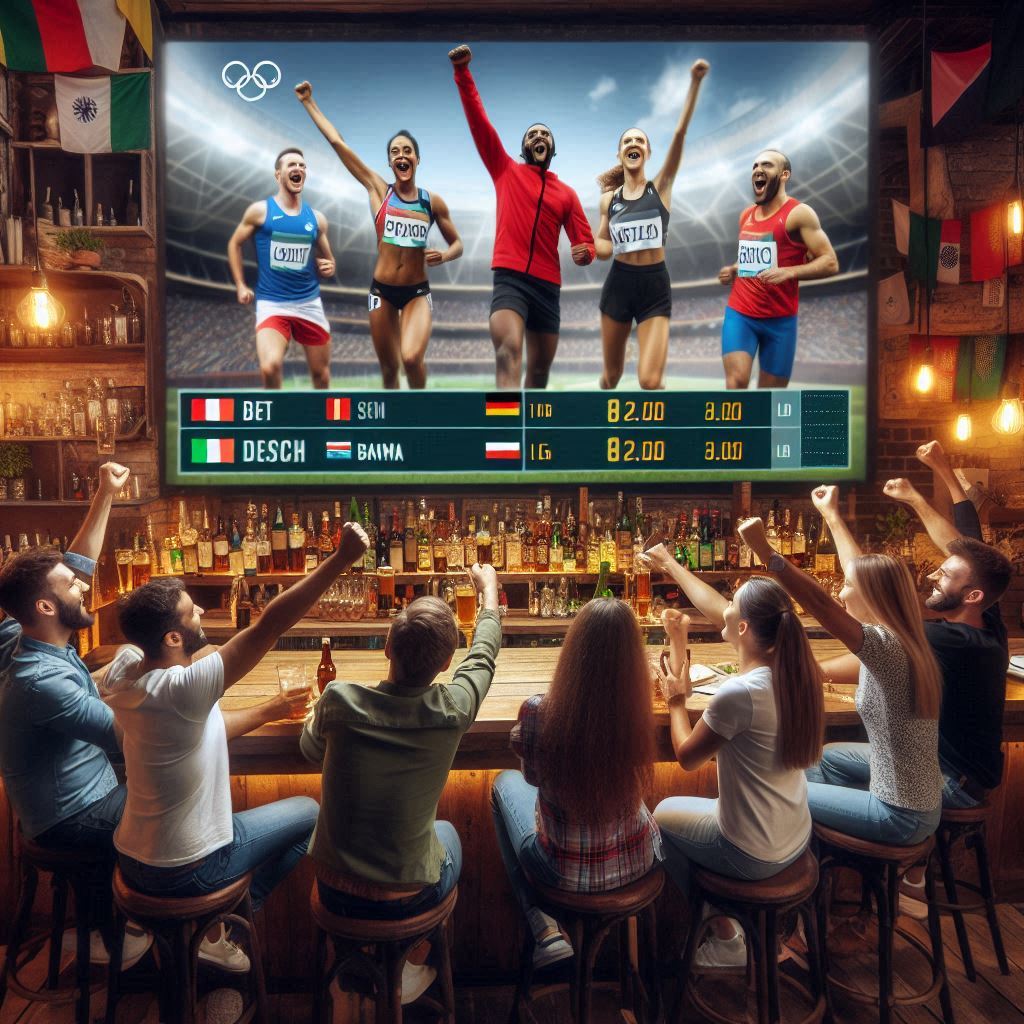
The Olympic Games, a pinnacle of athletic achievement, have captivated audiences worldwide for over a century. As the global sporting event continues to evolve, so does the interest in wagering on its outcomes. This raises an intriguing question: can you bet on the Olympics?
The intersection of sports and gambling has always been a complex issue, and the Olympics are no exception. With billions of viewers tuning in to watch athletes compete at the highest level, it’s natural for some to seek an extra thrill by placing bets on their favorite events or competitors.
The evolution of Olympic betting: From ancient wagers to modern regulations
The history of Olympic betting is as ancient as the Games themselves, dating back to the original contests in Greece. As spectators gathered to witness athletic prowess, they also engaged in wagering on outcomes, laying the foundation for the question: can you gamble on the Olympics?
Throughout can you bet on the olympics the centuries, the practice of betting on the Olympics evolved alongside the Games. In the 18th and 19th centuries, bets extended beyond traditional sports to include unusual challenges, such as long-distance walking or hopping competitions. This spirit of wagering on human feats set the stage for modern Olympic betting.
The 20th century saw a significant shift in Olympic gambling. As professional sports gained popularity and governing bodies emerged, betting on the Games became more structured. However, this period also brought controversies that shaped regulations. The 1980 “Miracle on Ice” hockey match between the USA and Soviet Union, with its unexpected outcome, highlighted the unpredictable nature of Olympic events and their impact on betting markets.
Concerns about match-fixing and corruption led to stricter oversight. The International Olympic Committee (IOC) began implementing measures to protect the integrity of the Games. A pivotal moment came with the 2012 London Olympics, where a sports betting monitoring clause was included in the Host City Contract for the first time. This initiative led to the creation of the Joint Assessment Unit (JAU) to monitor betting activities during the Games.
Can you bet on the olympics: the current landscape of Olympic wagering
The question “can you bet on Olympics” has a complex answer that varies greatly depending on your location. In recent years, the landscape of Olympic betting has evolved significantly, reflecting changes in both legislation and public attitudes towards sports wagering.
In the United States, the legality of Olympic betting has undergone a dramatic shift since the Supreme Court’s 2018 decision to overturn the federal ban on sports betting. Now, approximately two-thirds of U.S. adults live in states where they can gamble on the Olympics legally. However, regulations differ from state to state, with some allowing bets on all Olympic events and others restricting wagers on judged sports like gymnastics or figure skating.
Across Europe, Olympic betting is generally more established and widely accepted. Countries like the UK, Ireland, and Germany have robust regulatory frameworks that allow for a wide range of Olympic wagers. In contrast, some Asian countries maintain strict prohibitions on sports betting, including Olympic events.
When it comes to popular betting markets, the Olympics offer a unique array of options. Traditional team sports like basketball and soccer attract significant attention, with markets similar to those found in professional leagues. However, the Games also provide opportunities to bet on less common events. Medal count wagers, where bettors predict which countries will top the medal table, have gained popularity in recent years.
Can you bet on the olympics: interestingly, there are notable differences between betting on the Summer and Winter Olympics. The Summer Games typically offer a broader range of betting options due to the larger number of events and participating athletes. Popular summer markets include track and field, swimming, and gymnastics. In contrast, Winter Olympic betting often focuses on sports like ice hockey, skiing, and figure skating.
One unique aspect of Olympic betting is the opportunity to wager on the Special Olympics. While not as widely available as betting on the main Olympic Games, some sportsbooks do offer markets for these events, though it’s important to note that betting on the Special Olympics may be subject to additional ethical considerations and restrictions.
How to bet on the Olympic Games: A comprehensive guide
When it comes to the question “can you bet on the Olympics,” the answer is a resounding yes, and there are numerous ways to do so. The Olympic Games offer a diverse array of betting options that cater to both novice and experienced bettors alike.
One of the most popular types of Olympic wagers is medal count betting. This allows you to predict which countries will top the medal table, either overall or in specific categories like gold medals. For instance, you might bet on whether the United States will win more than 30 gold medals or if China will surpass their previous Olympic medal count.

Individual event betting is another exciting option. Whether you’re interested in track and field, swimming, or gymnastics, you can place bets on who will win gold, silver, or bronze in specific competitions. Some bookmakers even offer prop bets on things like world records being broken or the margin of victory in certain events.
For those wondering “can you gamble on the Olympics” more broadly, many online platforms and bookmakers now offer extensive Olympic betting markets. Popular sites like Bet365, William Hill, and Paddy Power provide comprehensive coverage of the Games, often with live betting options for major events. In the United States, where sports betting laws have recently changed, platforms like DraftKings and FanDuel have also entered the Olympic betting arena.
However can you bet on the olympics, it’s crucial to approach Olympic betting responsibly. Here are some tips to keep in mind:
- Set a budget and stick to it.
- Research the sports and athletes you’re betting on.
- Be aware of time zone differences that might affect live betting.
- Look for value bets rather than just backing favorites.
- Consider the unique nature of Olympic competition, where underdogs often shine.
Remember, while you can bet on Olympics events, it’s important to check the legality in your jurisdiction. Some regions have restrictions on Olympic betting, particularly for events involving minors or judged competitions.
For those interested in Special Olympics betting, options may be more limited. While some bookmakers offer markets for these events, it’s less common and often subject to stricter regulations. Always verify with your chosen platform whether they provide betting on the Special Olympics before placing any wagers.
Special Olympics betting: A new frontier in sports wagering
The Special Olympics, founded in 1968 by Eunice Kennedy Shriver, has grown from a backyard summer camp into a global movement celebrating the abilities of individuals with intellectual disabilities. This prestigious event now attracts millions of athletes from over 170 countries, competing in a wide array of Olympic-style sports. As the games have gained prominence, a new question has emerged: can you bet on the Special Olympics?
In a groundbreaking move, Special Olympics betting became a reality for the first time in the event’s 55-year history during the 2023 World Games in Berlin. This development has sparked both interest and controversy in the sports betting community. While it offers new opportunities for engagement with the games, it also raises important ethical considerations.
The introduction of betting markets for the Special Olympics aims to increase visibility and interest in the event. Proponents argue that it can bring more attention to the incredible achievements of these athletes, potentially leading to increased support and funding for programs that benefit individuals with intellectual disabilities. However, critics express concerns about the potential exploitation of vulnerable athletes and the integrity of the competition.
Availability of Special Olympics betting options is currently limited. As of 2023, only a handful of online platforms, such as BetOnline.ag, offer odds on Special Olympics events. These markets typically cover top-tier divisions and “non-unified sports” categories to ensure fair odds and wagering integrity. Popular betting options include basketball, powerlifting, and soccer.
Regulations surrounding betting on the Special Olympics are still evolving. As this is a new frontier in sports betting, many jurisdictions have yet to establish specific rules. Bettors should be aware that legality may vary by location, and it’s crucial to check local laws before participating.
To address ethical concerns, some bookmakers have pledged to donate a portion of their profits from Special Olympics betting to organizations supporting individuals with intellectual disabilities. This approach aims to balance the potential benefits of increased engagement with the need to protect and support the athletes.
Can you bet on the olympics: the double-edged sword of Olympic betting
The question “can you bet on Special Olympics” has sparked a debate about the pros and cons of Olympic wagering. This practice, while controversial, has both potential benefits and drawbacks that merit careful consideration.
On the positive side, betting can significantly boost interest in Olympic events. When people have a financial stake in the outcome, they’re more likely to watch and engage with the competitions. This increased viewership can lead to greater exposure for lesser-known sports and athletes, potentially attracting more funding and support for these disciplines. For example, sports like curling or modern pentathlon might gain new fans through betting interest.

Moreover, legal and regulated betting can provide a source of revenue for sports organizations and host cities. This additional income could be reinvested into athlete development programs or improving facilities, ultimately benefiting the sports ecosystem.
Another concern is the potential for problem gambling. The Olympics, with its wide array of events and global appeal, could exacerbate gambling addiction issues for vulnerable individuals. This is especially troubling when considering whether you can bet on Special Olympics, as it raises ethical questions about wagering on events involving athletes with intellectual disabilities.
Furthermore can you bet on the olympics, betting could potentially shift the focus away from the spirit of athletic excellence and international cooperation that the Olympics embody. Instead of celebrating human achievement, the conversation might turn to odds and payouts.
The Olympic integrity challenge: Athletes and betting
The question “can you gamble on the Olympics” raises significant concerns about the impact of betting on athletes and the integrity of the Games. As betting becomes more prevalent, Olympic organizations have implemented stringent measures to safeguard the competition’s purity.
To combat match-fixing, the International Olympic Committee (IOC) has established a comprehensive approach. This includes the creation of a Joint Assessment Unit (JAU) that monitors betting patterns during the Games. The JAU, first implemented during London 2012, analyzes vast amounts of betting data to detect any suspicious activity. Additionally, the IOC has inserted a sports betting monitoring clause in Host City Contracts, ensuring a coordinated effort to protect the Games’ integrity.
Education plays a crucial role in prevention. Athletes are now required to undergo integrity training, which includes understanding the risks of match-fixing and the consequences of engaging in such activities. The IOC has also implemented a strict “no betting” policy for all Olympic participants, including athletes, coaches, and officials.
From the athletes’ perspective, opinions on Olympic betting are mixed. Some view it as a potential threat to their performance and the spirit of fair competition. They worry about the added pressure and the risk of being approached by unscrupulous individuals seeking to manipulate results.
Conversely, other athletes see regulated betting as a way to increase interest in their sports, potentially leading to greater funding and exposure. However, they emphasize the need for robust protective measures to ensure that betting doesn’t compromise the integrity of their performances.
The Olympic movement faces a delicate balance between embracing the economic benefits of betting and maintaining the Games’ ethical standards. As the landscape evolves, ongoing collaboration between athletes, governing bodies, and betting regulators will be crucial to preserve the Olympic ideals of fair play and sporting excellence.
The future of Olympic wagering: A balanced approach
As we’ve explored the complex landscape of Olympic betting, it’s clear that the question “can you bet on the Olympics” doesn’t have a simple answer. The practice has evolved from ancient wagers to a modern, regulated industry, offering diverse betting options for both traditional and Special Olympics events.
While Olympic betting can increase engagement and provide financial benefits, it also poses risks to the integrity of the Games and athlete welfare. The future of this practice will likely depend on striking a delicate balance between entertainment and preserving Olympic ideals.
As technology advances and regulations evolve, we can expect to see more sophisticated monitoring systems and stricter controls to prevent match-fixing. The ongoing dialogue between athletes, governing bodies, and betting operators will be crucial in shaping policies that protect the spirit of the Olympics while allowing for responsible wagering.
Ultimately can you bet on the olympics? The question of whether you can gamble on the Olympics will continue to be answered differently across jurisdictions. However, with proper safeguards and ethical considerations in place, Olympic betting has the potential to enhance the global sporting experience without compromising the values that make the Games truly special.




